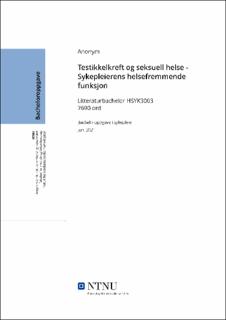| dc.contributor.advisor | Sivertsen, Heidi | |
| dc.contributor.author | Vigdal, Julie Landrø | |
| dc.date.accessioned | 2021-09-25T16:25:08Z | |
| dc.date.available | 2021-09-25T16:25:08Z | |
| dc.date.issued | 2021 | |
| dc.identifier | no.ntnu:inspera:81643445:34408838 | |
| dc.identifier.uri | https://hdl.handle.net/11250/2782960 | |
| dc.description.abstract | Bakgrunn: Testikkelkreft er en sjelden kreftform, men samtidig er det den hyppigste kreftformen blant unge menn. Hyppigheten økter, samtidig som overlevelsen stiger. Dette fører til at flere menn kommer til å leve videre med konsekvensene av diagnose og behandling. Testikkelkreft opptrer i en sårbar alder hvor relasjoner til andre, reproduksjon og personlig utvikling er i fokus. Spørsmålet blir da hvordan den seksuelle helsen blir påvirket og hvordan sykepleiere kan hjelpe pasientene med disse utfordringene.
Hensikt: Å undersøke hvordan sykepleiere i informasjonssamtaler kan fremme seksuell helse hos testikkelkreftpasienter.
Metode: Strukturert litteraturstudie som benytter eksisterende fagkunnskap, teori og 7 forskningsartikler med både kvalitativ og kvantitativ metode. Evans sin analysemodell ble benyttet for å analyse forskningsartiklene.
Resultat: Seksuell helse blir berørt hos testikkelkreftpasienter, på kort og lang sikt. Pasientene opplevde samtidig manglende informasjon om hvordan de skulle håndtere seneffektene, og mangel på mestringsressurser for å mestre sin situasjon. Samtidig gir sykepleiere seksuell helse lav prioritet, og det er flere faktorer som hindrer dem i å snakke om temaet.
Konklusjon: Sykepleierne bør i informasjonssamtaler legge til rette for at seksuell helse blir snakket om med pasientene. Her kan PLISSIT-modellen være et nyttig verktøy å benytte. Samtidig bør informasjonen være tilpasset pasientens situasjon, og det vil være hensiktsmessig å fokusere på å styrke pasientenes mestringsressurser for å styrke deres opplevelse av sammenheng som en helhet. På denne måten vil pasientene få et bedre utgangspunkt til å møte utfordringer knyttet til deres seksuelle helse.
Nøkkelord: testikkelkreft, seksuell helse, helsefemming, sykepleie, informasjon | |
| dc.description.abstract | Background: Testicular cancer is a rare form of cancer, but at the same time it is the most common form of cancer among young men. The frequency increases, but so do survival rates. More men will therefore live with the consequences of diagnosis and treatment. Testicular cancer occurs at a vulnerable age where relationships, reproduction and personal development are in focus. The question then becomes how sexual health is affected and how nurses can help them with these challenges.
Aim: To investigate how nurses in information interviews can promote sexual health among testicular cancer patients.
Method: Structured literature study that use existing knowledge, theory and 7 research articles with both qualitative and quantitative methods. Evans' analysis model was used to analyze the research articles.
Results: Sexual health is affected in testicular cancer patients, in both short- and long term. At the same time, patients experience a lack of information on how to deal with the late effects, and a lack of coping resources to cope with their situation. At the same time, nurses give sexual health low priority, and there are several factors that prevent them from talking about the topic.
Conclusion: In information interviews, nurses should facilitate that sexual health is discussed with patients. The PLISSIT model can be a useful tool. The information should also be adapted to the patient's situation, and it will be appropriate to focus on strengthening patients' coping resources in order to strengthen their sense of coherence as a whole. In this way, patients will have a better base to meet challenges related to their sexual health.
Keywords: testicular cancer, sexual health, health promotion, nursing, information | |
| dc.language | nob | |
| dc.publisher | NTNU | |
| dc.title | Testikkelkreft og seksuell helse - sykepleierens helsefremmende funksjon | |
| dc.type | Bachelor thesis | |
